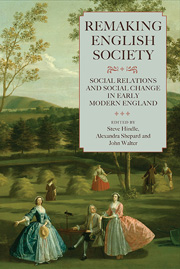Book contents
- Frontmatter
- Contents
- List of Illustrations, Figures, Maps and Tables
- Acknowledgements
- Notes on Contributors
- List of Abbreviations
- 1 The Making and Remaking of Early Modern English Social History
- 2 Brokering Fatherhood: Illegitimacy and Paternal Rights and Responsibilities in Early Modern England
- 3 Gender, Sexuality and the Consumption of Musical Culture in Eighteenth-Century London
- 4 Where was Mrs Turner? Governance and Gender in an Eighteenth-Century Village
- 5 Local Arithmetic: Information Cultures in Early Modern England
- 6 Intoxicants and the Early Modern City
- 7 Food, Drink and Social Distinction in Early Modern England
- 8 Written Obligations, Litigation and Neighbourliness, 1580–1680
- 9 Witchcraft and Neighbourliness in Early Modern England
- 10 Deference, Paternalism and Popular Memory in Early Modern England
- 11 Work, Reward and Labour Discipline in Late Seventeenth-Century England
- 12 Living in Poverty in Eighteenth-Century Terling
- 13 From Commonwealth to Public Opulence: The Redefinition of Wealth and Government in Early Modern Britain
- Appendix: Bibliography of the Published Writings of keith Wrightson from 1974 to 2011
- Index
- Tabula Gratulatoria
- STUDIES IN EARLY MODERN CULTURAL, POLITICAL AND SOCIAL HISTORY
9 - Witchcraft and Neighbourliness in Early Modern England
Published online by Cambridge University Press: 05 May 2013
- Frontmatter
- Contents
- List of Illustrations, Figures, Maps and Tables
- Acknowledgements
- Notes on Contributors
- List of Abbreviations
- 1 The Making and Remaking of Early Modern English Social History
- 2 Brokering Fatherhood: Illegitimacy and Paternal Rights and Responsibilities in Early Modern England
- 3 Gender, Sexuality and the Consumption of Musical Culture in Eighteenth-Century London
- 4 Where was Mrs Turner? Governance and Gender in an Eighteenth-Century Village
- 5 Local Arithmetic: Information Cultures in Early Modern England
- 6 Intoxicants and the Early Modern City
- 7 Food, Drink and Social Distinction in Early Modern England
- 8 Written Obligations, Litigation and Neighbourliness, 1580–1680
- 9 Witchcraft and Neighbourliness in Early Modern England
- 10 Deference, Paternalism and Popular Memory in Early Modern England
- 11 Work, Reward and Labour Discipline in Late Seventeenth-Century England
- 12 Living in Poverty in Eighteenth-Century Terling
- 13 From Commonwealth to Public Opulence: The Redefinition of Wealth and Government in Early Modern Britain
- Appendix: Bibliography of the Published Writings of keith Wrightson from 1974 to 2011
- Index
- Tabula Gratulatoria
- STUDIES IN EARLY MODERN CULTURAL, POLITICAL AND SOCIAL HISTORY
Summary
The history of witchcraft as a crime in England maps roughly onto the early modern period as a whole. Exactly how many suspected witches were prosecuted between 1542 and 1736 is unknown; we can only extrapolate from where records are most complete. An estimated 1,000 trials, spread over two centuries and 9,000 parishes, suggests that it would have been rare to experience one directly. Some places, notably in Essex, indicted scores of witches; many more did not. Despite the persistent notion that villagers routinely used accusations to explain misfortunes and attack enemies, the numbers speak for themselves. Perhaps, then, witchcraft has attracted more attention than it deserves. And yet it is justified as a historical subject by more than quantification alone. Case-studies have revealed fine details of social activity and change: the interplay of learned and plebeian ideas, shifting attitudes to gender, popular legal activity, and so on. Witchcraft has been profitably studied from above as ideology and policy; from below as an expression of socio-economic conflict; and from within as a spyhole on early modern subjectivity, fantasy and psychological meaning. It is a point of entry, not an end in itself.
Unanswered questions nonetheless remain. The political dimension in local society deserves more attention: how did particular personalities and affiliations permit (or inhibit) the development of suspicions into accusations? Fresh connections might also be made by historians of medicine, law and art, likewise by theologians and philologists.
- Type
- Chapter
- Information
- Remaking English SocietySocial Relations and Social Change in Early Modern England, pp. 211 - 232Publisher: Boydell & BrewerPrint publication year: 2013

